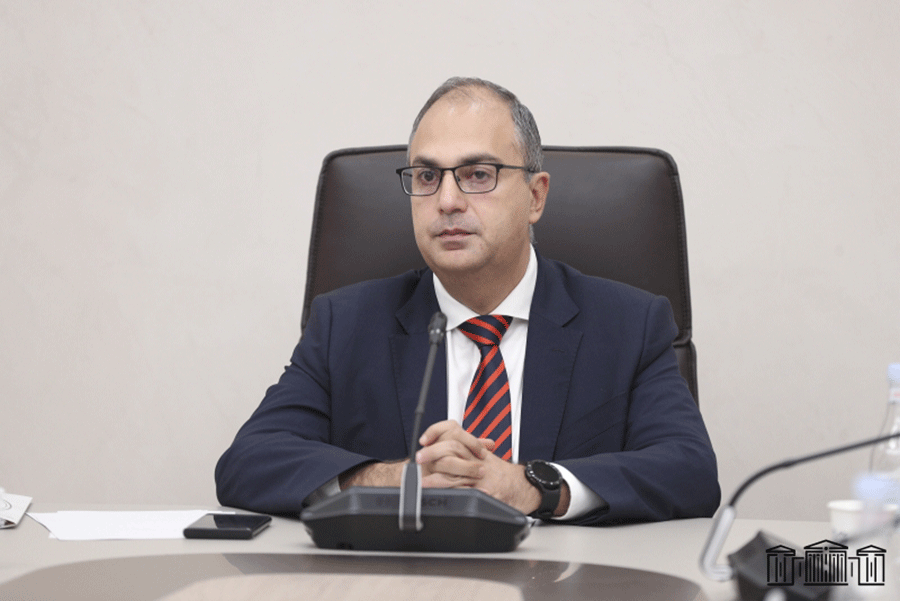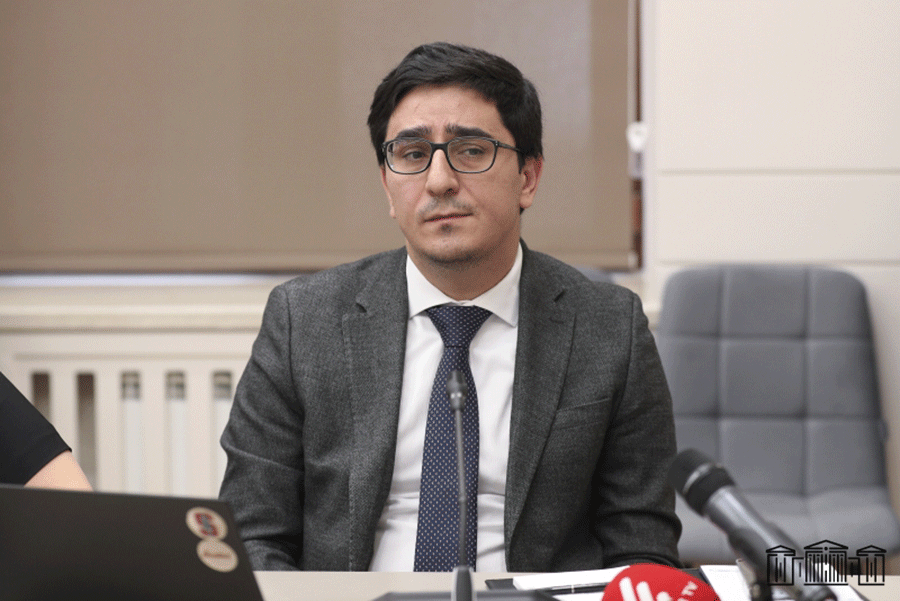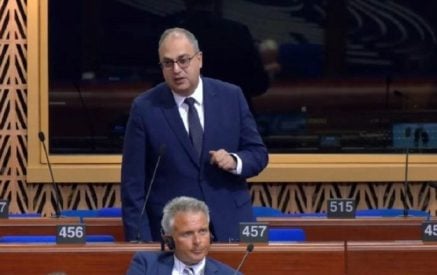At the sitting of September 28, the NA Standing Committee on State and Legal Affairs debated the draft on Ratifying the Rome Statute of the International Criminal Court signed on 17 July 1998 and on Adopting the Statement on Retroactively Recognizing the Jurisdiction of the International Criminal Court in accordance with Article 12.3 of the Statute.
The representative on International Legal Matters Yeghishe Kirakosyan presented the background of the issue, reminding that the Government approved this draft back on 29 December 2022.
“Approving the draft at that time was conditioned by the large-scale aggression carried out by Azerbaijan against the Republic of Armenia in 2022 and a number of gross war crimes committed during the aggression. You will remember the heinous shooting of Armenian servicemen that took place in Lake Sev area and other war crimes,” Yeghishe Kirakosyan said in particular.
Read also
He stated that the International Criminal Court exercises its jurisdiction in order to set liability for a number of crimes. Those crimes are: genocide, crimes against humanity, war crimes. There are also new amendments in the Statute, one of which is the Kampala Amendment, which was made in 2010 and which added the crime of aggression to the list of crimes. Yeghishe Kirakosyan informed that at the moment the version of the draft without Kampala Amendment has been submitted for ratification. The rapporteur considered it possible to ratify the Kampala Amendment in the future. “These are the crimes that are subject to the Court’s jurisdiction. It is clear that the crimes are serious crimes: genocide, crimes against humanity, war crimes, and also aggression. “Unfortunately, the necessity for this draft is reaffirmed by the events that are happening today,” Yeghishe Kirakosyan said. He clarified that the issue also concerns tens of thousands of our compatriots who are forcibly displaced from Nagorno Karabakh.
The Government proposed to implement the process of draft ratification in two parts. “The Government has proposed to recognize the jurisdiction of the court retroactively from 10 May 2021, and this is based on Article 12.3 of the Statute, which actually gives the opportunity to give some retroactive effect to the Statute,” he said. “In addition to retroactive recognition, ratification is also proposed. We believe that ratification gives the Republic of Armenia the opportunity to fully join the Court,” he said, emphasizing the importance of ratification. Yeghishe Kirakosyan stressed that the main objective of the draft is to launch a new, additional international legal mechanism for the liability of crimes committed by Azerbaijan, as well as to have an additional, preventive mechanism.
It was noted that in case of ratification by the National Assembly, the document will enter into force within 60 days.
The deputy of the NA Civil Contract Faction Alkhas Ghazaryan inquired from Yeghishe Kirakosyan whether the process of forced displacement of Nagorno-Karabakh Armenians is under the jurisdiction of the International Criminal Court. In response to the question, the key rapporteur said that we are talking about the crime provided by the Statute, which, yes, falls within the jurisdiction of the court.
The Chair of the Standing Committee on State and Legal Affairs Vladimir Vardanyan noted in his turn that our country ratifies the Agreement in the form in which it was adopted at the diplomatic conference without the Kampala Amendments. The MP said that the definitions of aggression and crime were defined by those amendments. “Therefore, a question arises whether our country will not claim the jurisdiction of the court in case of aggression and crime,” Vladimir Vardanyan asked.
Yeghishe Kirakosyan informed that the Kampala Amendments will start working after the ratification of the Agreement, because it requires the ratification of certain domestic procedures.
“How effective will this legal toolkit be? Is it possible that a judicial act will be issued again and not implemented by Azerbaijan?” Arusyak Julhakyan asked the key rapporteur and justified the necessity of the question by stating: “Public skepticism has arisen regarding the decisions made by international courts. Conditioned by the blockade of the Lachin Corridor and regarding other issues, we have several international court acts that are not implemented.”
“You are right, we have very clear decisions of international courts, which are ignored by Azerbaijan. Unfortunately, the mechanisms in the international legal system are incomplete and the control over the application of the Court’s decisions is carried out by different bodies, many questions remain open. There is a certain inefficiency, but we should not consider the international courts only in the logic of the domestic court or domestic judicial acts, because the influence of the decisions of these courts has a multi-layered political impact,” Yeghishe Kirakosyan said. He added that the impression of the public is objective. Judicial acts do not have immediate effects, but this does not mean that we should not fight in legal processes. According to the key rapporteur, the step to ratify the Statute of the International Criminal Court is also a cultural impulse in terms of values, which will have a long-term impact.
The Committee Chair Vladimir Vardanyan considered it necessary to adopt the draft in his related report by presenting justifications. He informed that all the member states of the European Union, the vast majority of the member states of the Council of Europe have signed and ratified the document, and they consider it as the most important component of the European value system and the leading international legal system. “Azerbaijan is the only state in our region, in the South Caucasus, which has not signed and ratified the document,” he underscored, adding that 131 states have signed the document and 122 have ratified it. In other words, the vast majority of UN member states, more than half, are the members of this document.
Addressing the public and emphasizing the importance of the court, Vladimir Vardanyan mentioned that it is a rather slow functioning structure, and we cannot expect very fast and effective solutions from that Court today. According to him, the reasons are objective. “In the history of the International Criminal Court, in the research dedicated to the International Criminal Court, we have always been and will be related to the words ‘Armenian’ and ‘Armenia’. This is not only a legal, but also a political obligation. In my opinion, this is also a moral duty to ratify a document that came from the pains of the Armenian people. And perhaps taking a much earlier and clearer orientation on this issue would have given us the opportunity to avoid certain events that happened to us,” the Committee Chair said, summing up his speech.
During the speeches, Alkhas Ghazaryan reminded that in May 2021, the Azerbaijani armed forces carried out a military aggression against the RA and invaded the sovereign territory of our country, followed by the Azerbaijani aggression on September 13-14, 2022, and then the forced displacement of our compatriots from Nagorno-Karabakh. The deputy stated that the ratification of the Rome Statute as soon as possible derives from the interests of the citizens of our country.
Arpine Davoyan considered important the fact that after the ratification of the draft, it will retroactively reflect on the military operations carried out by Azerbaijan until now and will be the basis for restraining possible attacks. The deputy noticed that the opposition colleagues, who previously opposed the debated draft, did not take part in the Committee sitting.
In his final speech, the Committee Chair Vladimir Vardanyan said: “They tried to consider the ratification of this document in the context of the deterioration of Armenian-Russian relations. It was exclusively manipulative and did not affect Armenian-Russian relations in any way. They have done long enough work so that after the ratification of this document, the Armenian-Russian allied relations will not be threatened. Article 98.2 of the Statute of the International Criminal Court provides that possibility. We have always been in favor of regulating this or that relation on the basis of a legal contract. The ratification of this document should not be seen as a step against any country. The Agreement is directed against those international criminals who unleashed aggression against the RA and carried out ethnic cleansing in Nagorno-Karabakh.”
The Committee endorsed the issue, proposing to include it in the agenda of the regular sittings of the National Assembly.
National Assembly of the Republic of Armenia




























































